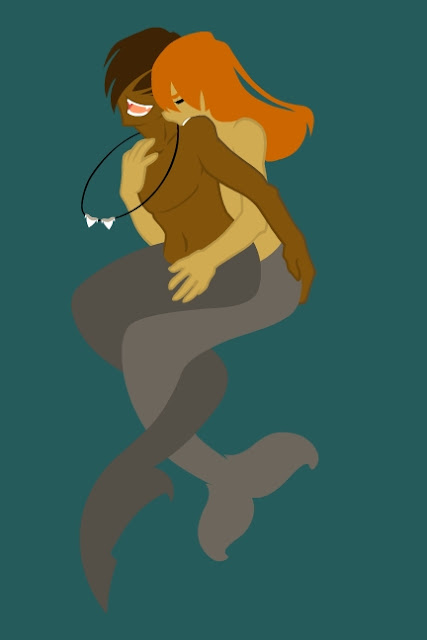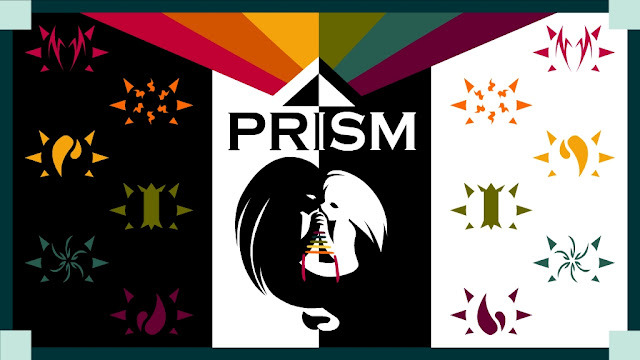Hi all! Today I've got Whitney Delaglio back to talk about Prism, a project we discussed a long time ago that's now coming up on Kickstarter! To keep up on what's coming up while the project's counting down to crowdfunding, follow Whitney on G+ and mind the Little Wish Productions site. I hope you enjoy hearing what Whitney's got to say about this awesome project!
--
Tell me a little about Prism. What excites you about it?
Prism is a roleplaying game about relationships and conflict resolution set in an aquatic world. Instead of using dice, players will rely on predetermined levels of expertise to solve narrative conflicts, and interact with others. The rules rely less on crunch, and more on negotiations between players and the GM. I'm excited about it because in most games, characters are stuck on land, so it's difficult to play characters that thrive in the water. I'm also excited about this project because it encourages sensuality and social combat.
What makes the aquatic environment different for characters, mechanically and narratively?
What makes the aquatic environment different for characters, mechanically and narratively?
I am a huge fan of sealife, so it was important to integrate an underwater environment to Prism. I designed the game to give players an opportunity to play as merfolk, or humanoids that turn into tiny sea creatures. Since all six humanoids in the game are amphibious, it also means there can be unhindered underwater exploration. It also gave me the opportunity to draw plant folk with the attributes of a water lily, and merfolk with the qualities of a shark, wearing their own teeth as a necklace.
How do the negotiations work between players and the GM? What kind of power does each player hold at the table to influence the results of a conflict?
How do the negotiations work between players and the GM? What kind of power does each player hold at the table to influence the results of a conflict?
I'm not a huge fan of rolling dice with the exception being Lady Blackbird. I didn't like how you could dump all your points into something you really want to excel at, roll poorly, and not get the results you want. So instead if a character doesn't have enough expertise, the player can either agree to have their character succeed at a cost, or make a case that it takes more than one skill to resolve the conflict.
For example, a Chameleon (has the ability to cast cantrips) wants to impress someone with a lavish meal, but doesn't have enough expertise to do so. They could make argument that a fire cantrip (which requires the use of another skill) could help them cook the food more evenly.
For example, a Chameleon (has the ability to cast cantrips) wants to impress someone with a lavish meal, but doesn't have enough expertise to do so. They could make argument that a fire cantrip (which requires the use of another skill) could help them cook the food more evenly.
What techniques did you use for the art in Prism, and how did you conceptualize the designs - did you do drafts of the illustrations, get inspirations from playtests, etc.?
Most of the artwork in the book are pinups. My goal was to draw sexy people and not sexy objects. The rest is either revamped artwork from back when Prism was a video game concept, or inspired by the comic that preceded the game (such as the symbols that represent the six realms). The artwork in the game either started out as a pencil sketches, a sketch on my phone (S Note), or were started from scratch using Adobe Animate.
What's the most challenging (but promising!) part of putting Prism out there for the public, and how do you feel about the final product? What parts of it stick out to you as your favorite?
What's the most challenging (but promising!) part of putting Prism out there for the public, and how do you feel about the final product? What parts of it stick out to you as your favorite?
I wanted to make a game about relationships emotional intimacy, but that presented me with the challenge of making a game where a player can feel safe being vulnerable. I've mentioned elsewhere how consent is sometimes conveyed as a rigid negotiation. Where you add and remove filling from the sandwich, until it's a sandwich no one involved wants to eat anymore. I tried to make Prism a game where you discuss consent from the beginning, and it remains a fluid conversation that continues during play. So, the sandwich starts off on the table, and anyone at any given time can say...you know, I usually really like this to be in my sandwich, but today I don't have the appetite for it...or, my friend and I really want to add this to the sandwich, but we can change our mind if either of us want to.
I think the final product looks gorgeous. My favorite part is the Tea Party (character generation). It really takes you gently by the hand and walks you through the process.
I think the final product looks gorgeous. My favorite part is the Tea Party (character generation). It really takes you gently by the hand and walks you through the process.
 |
| I love the art <3 |
--
Thanks so much to Whitney for the interview! I hope you all enjoyed reading about Prism and that you'll check it out when it's live on Kickstarter!
Thoughty is supported by the community on patreon.com/briecs. Tell your friends!
To leave some cash in the tip jar, go to http://paypal.me/thoughty.
If you'd like to be interviewed for Thoughty, or have a project featured, follow the instructions on the Contact page.


No comments:
Post a Comment